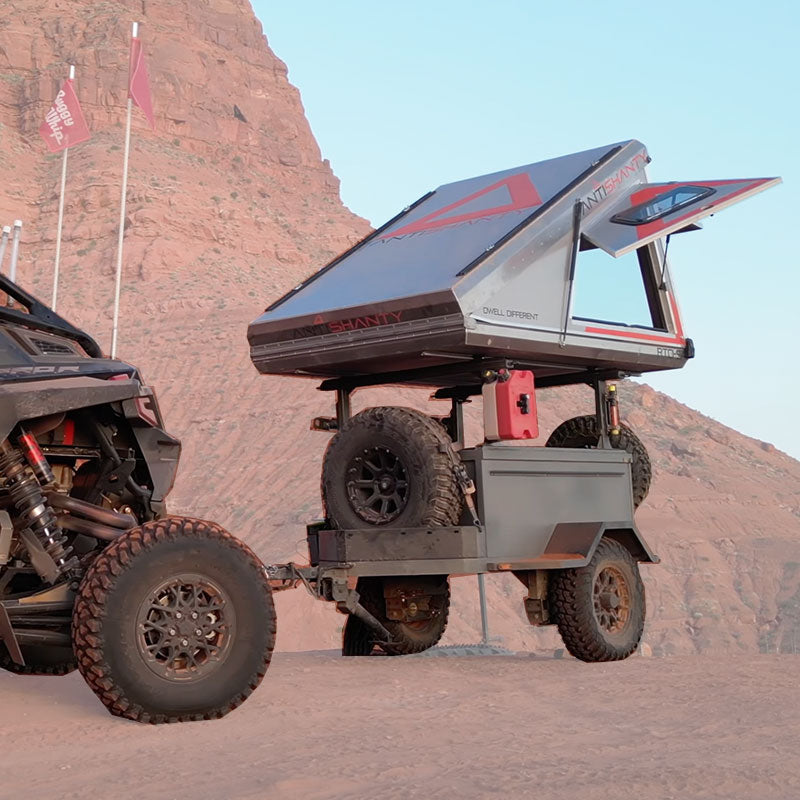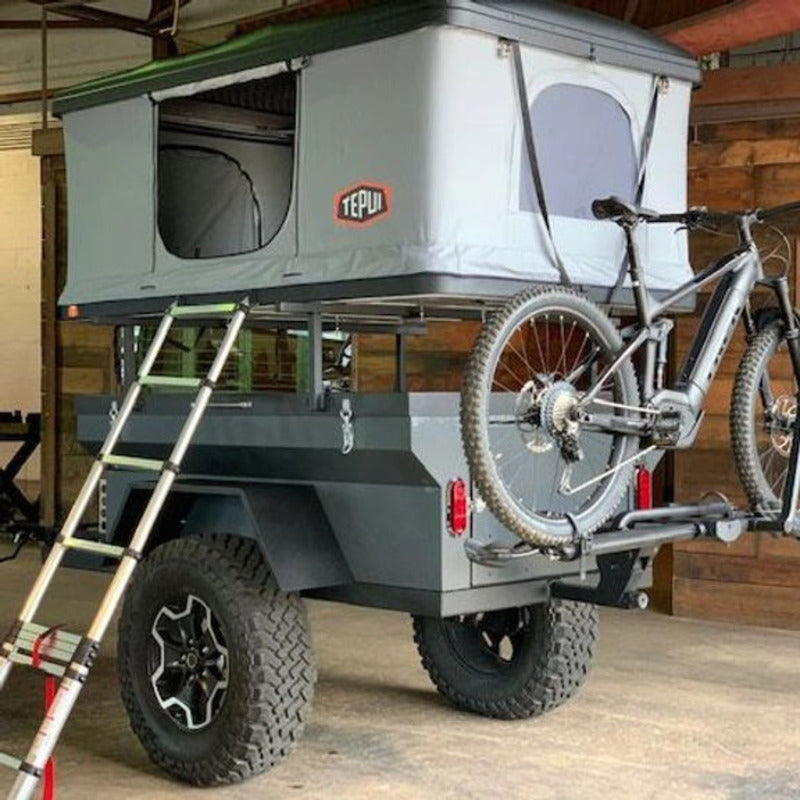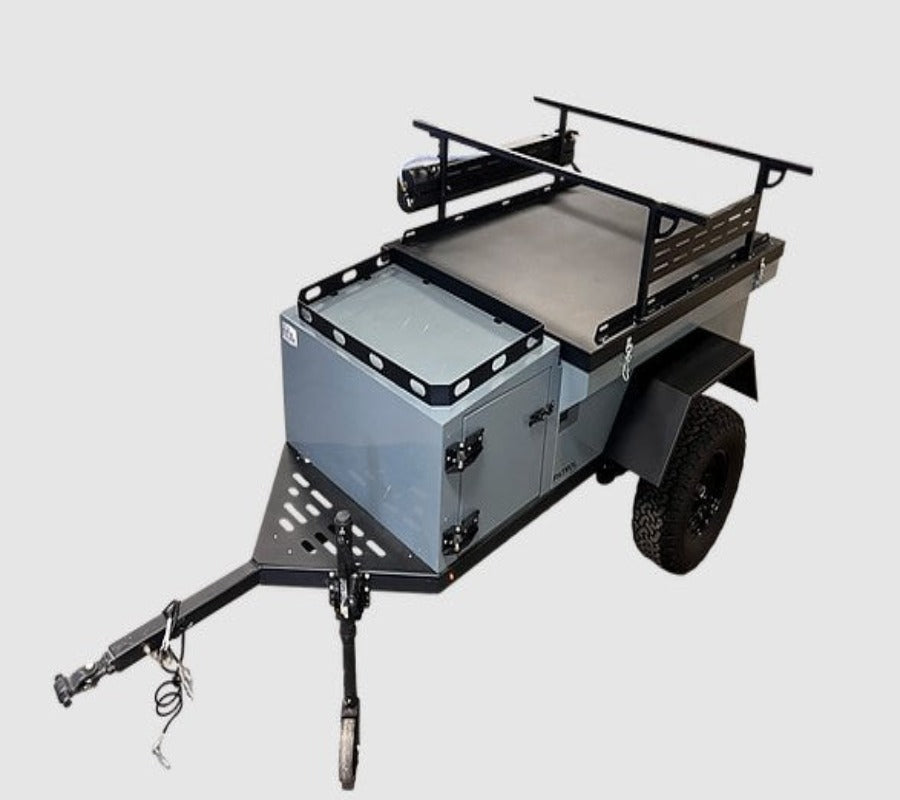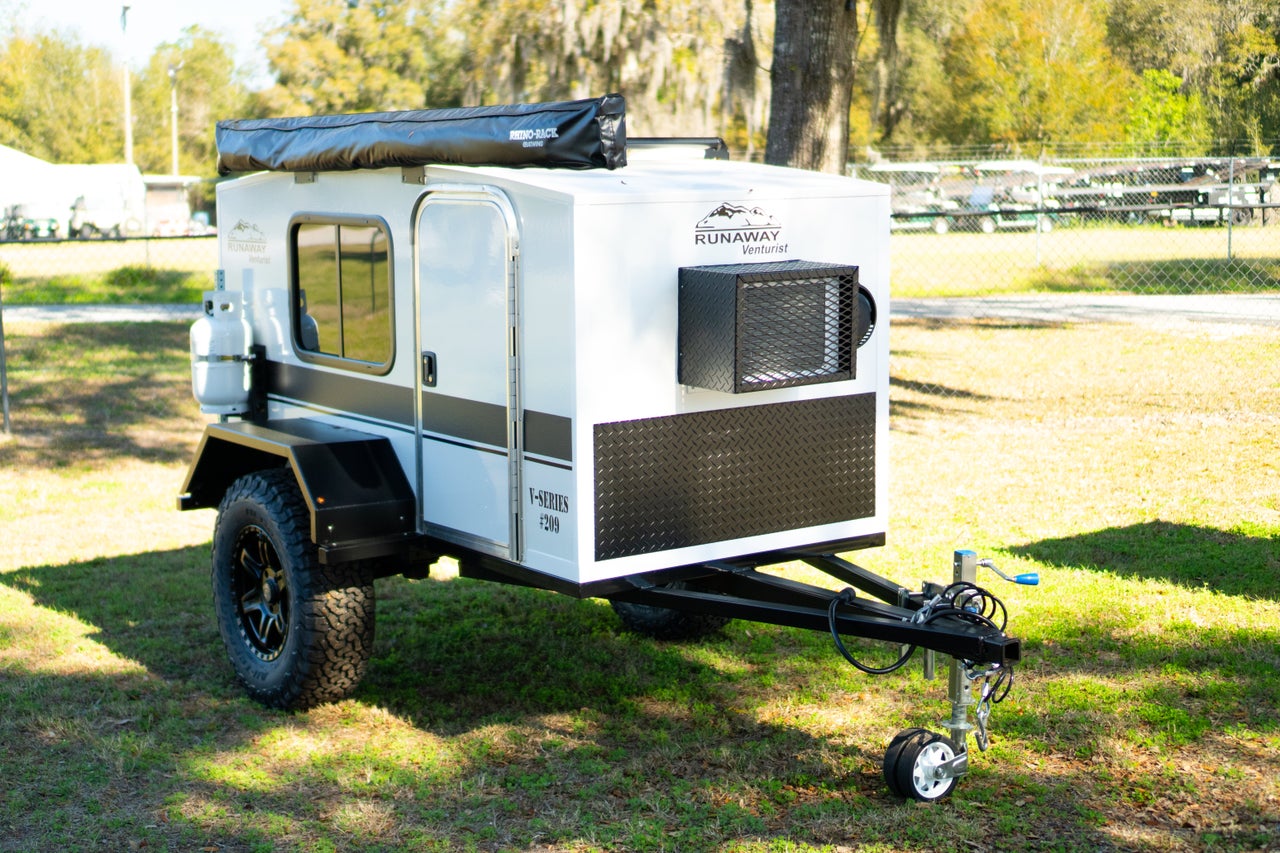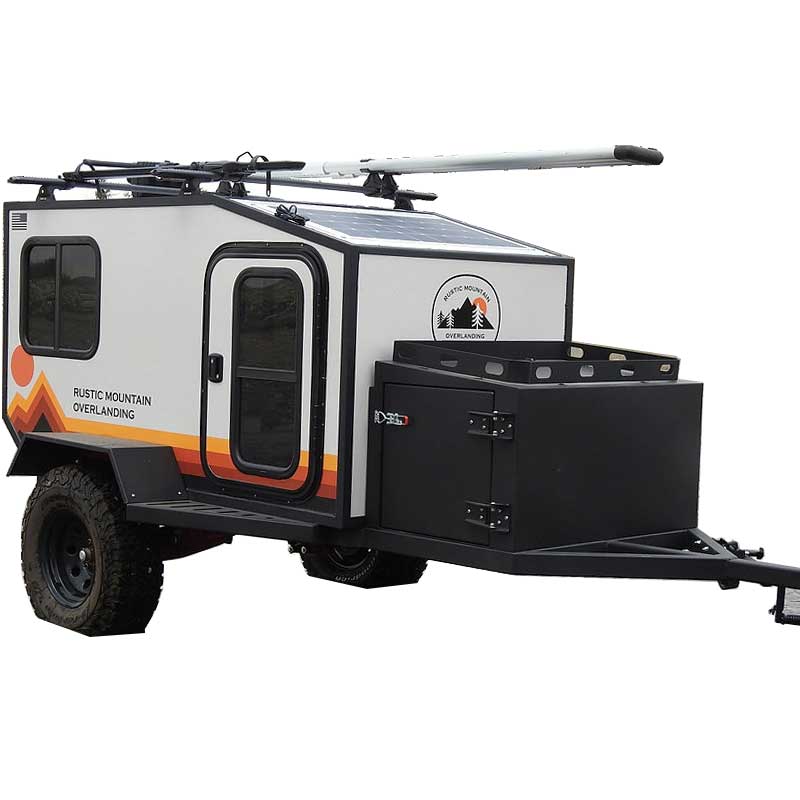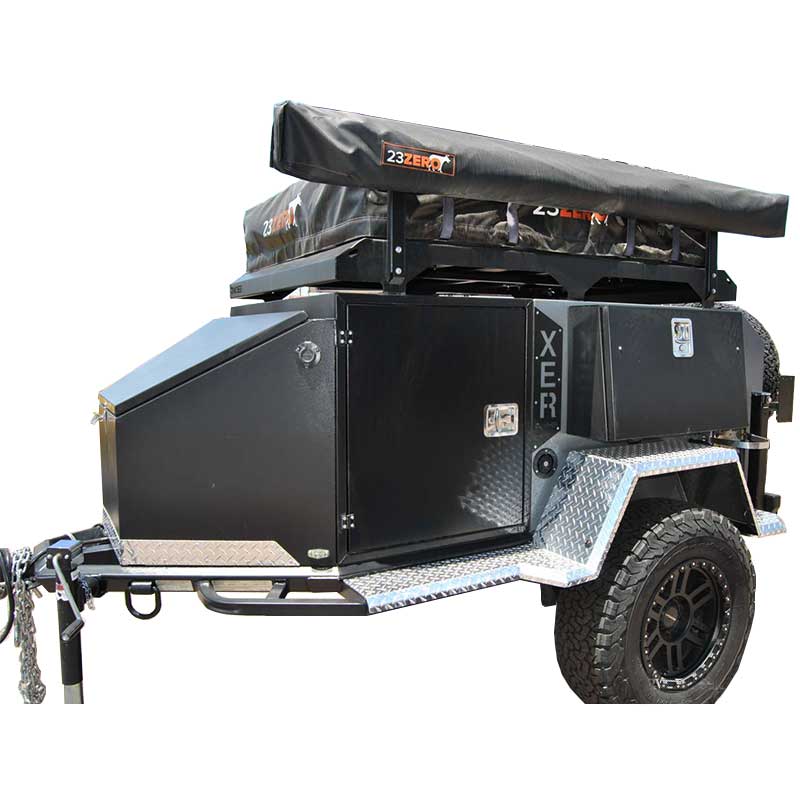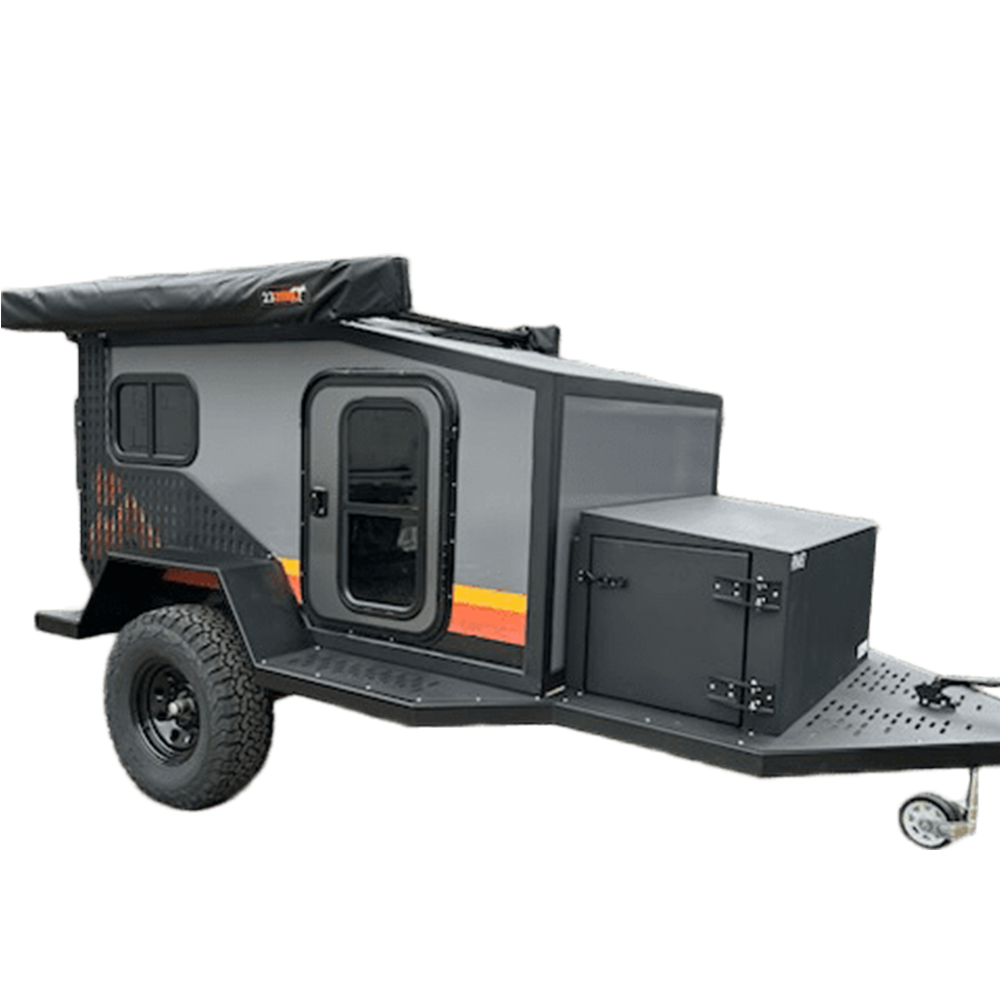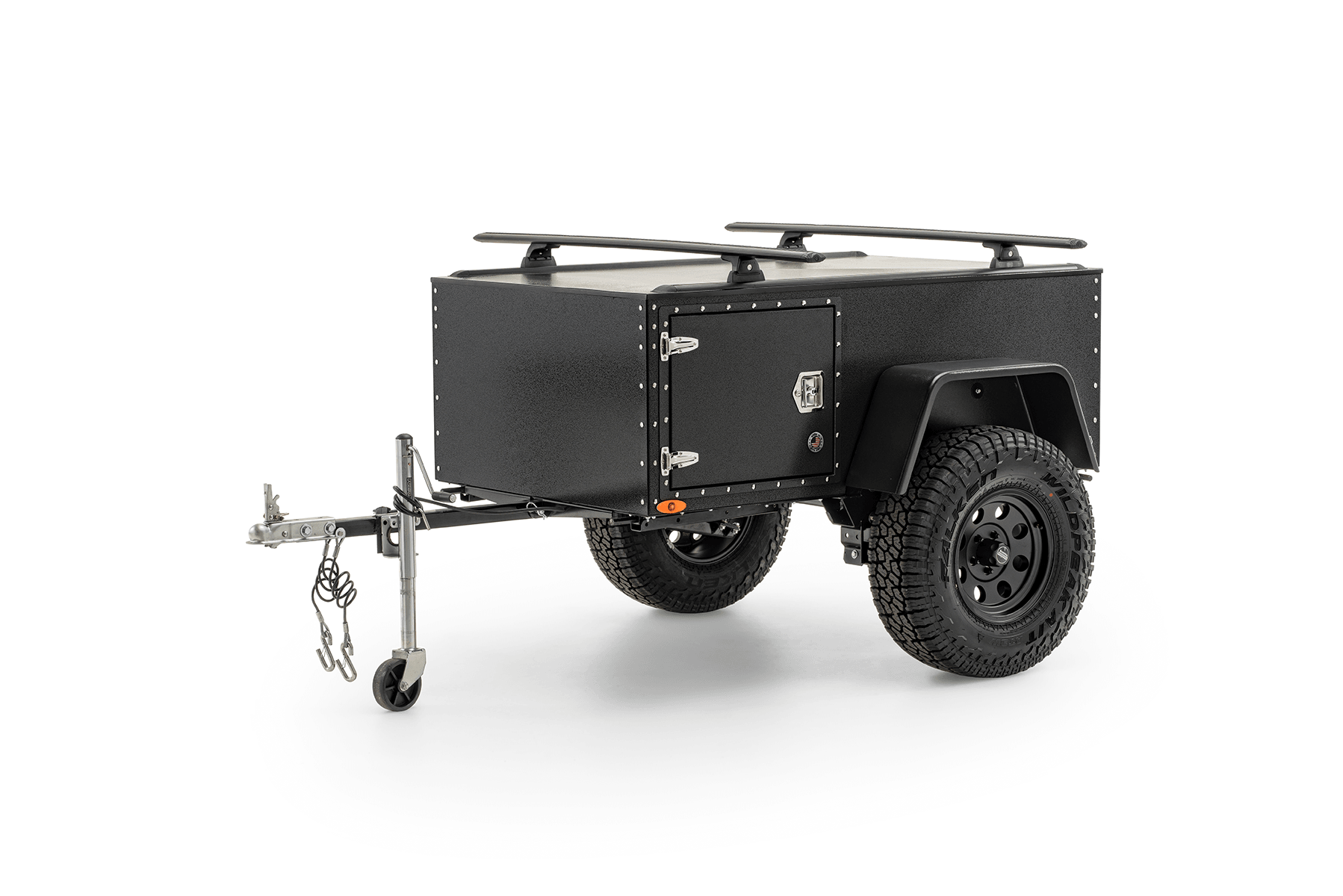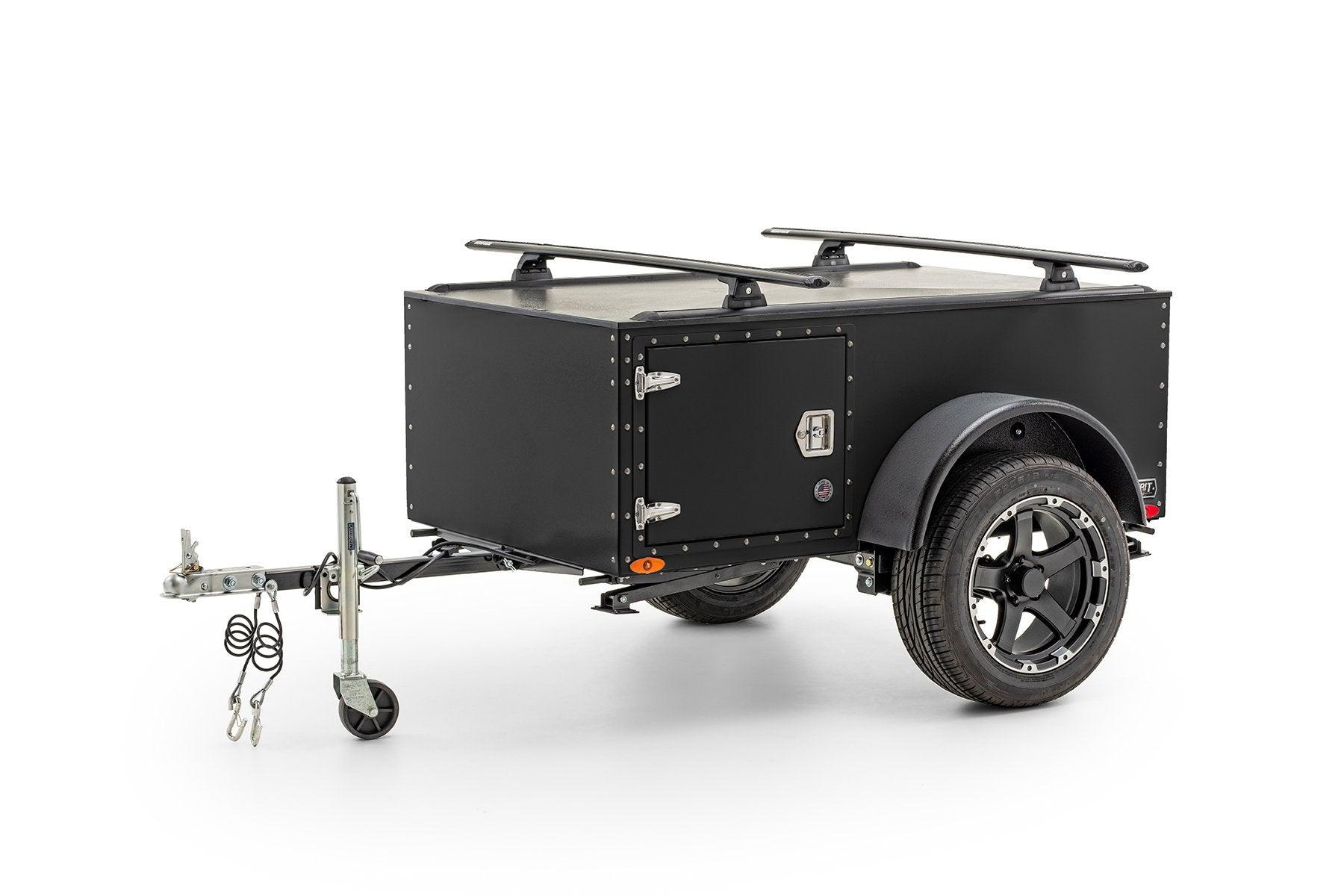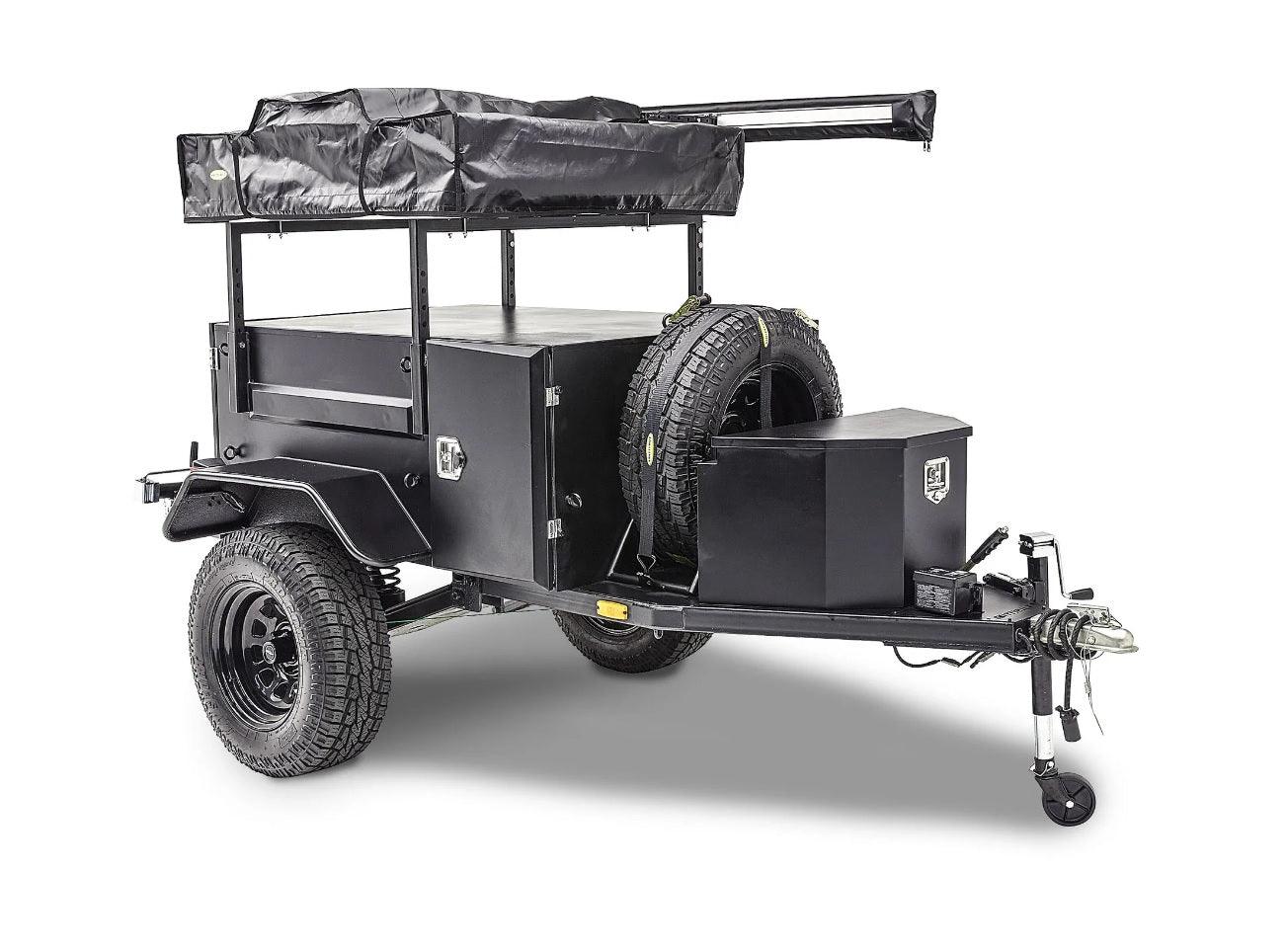Off Road Trailer
Off Road Trailers: The Ultimate Overlanding Companion
While a capable 4x4 can get you to many places, your adventure is often limited by the space within your vehicle. This is where the off road trailer transforms the journey.It is more than merely a box on wheels; it's a mobile basecamp, gear hauler, and portal for extended, comfortable, and self-sufficient exploration.
An overlanding trailer is designed to take the same beating as your off-road vehicle. While traditional camping or utility trailers are built for highway use, the construction of the overlanding is typically more heavy-duty, with a high clearance suspension and articulation to handle rocks and wild, bumpy trails. From a basic off road utility trailer to haul your dirt bikes and camping gear to a full blown off road camper trailer with a kitchen and sleeping quarters, there is a model designed to fit your style of adventure. This guide will cover everything you need to know from the different types to the best models out there.
Table of Contents
- Best Off Road Trailer Models
- Runaway Campers Venturist Standard Trailer 6x8
- TRAIL Trailer MOD – Modular Passenger Vehicle
- OVS Off Road Trailer - Military Style With Full Articulating Suspension
- Rustic Mountain Overland Trailer Patrol XCT
- TRAIL Trailer MOD – Modular UTV
- Why You Need an Off Road Trailer
- Here are a few ways an offroad trailer can be a game-changer:
- Important Factors to Consider When Buying an Off Road Trailer
- Different Types of Off Road Trailers
- Off Road Camper Van vs. Off Road Trailer
- What You Should Understand Prior to Buying One
- Frequently Asked Questions
Best Off Road Trailer Models
Runaway Campers Venturist Standard Trailer 6x8

The Runaway Venturist 6x8 is a lightweight off-road camper built for DIY adventures. At about 1,100 lbs dry, it uses a 3,500 lb Timbren axle-less suspension with a 4-inch lift, giving around 20 inches of ground clearance. Its fiberglass exterior and diamond-plate nose guard keep it tough on the trail. The interior is a blank slate that sleeps two, allowing owners to outfit it. It’s often considered one of the best off road trailer for minimalists.
Pros
- Excellent off-road build and high clearance
- Very lightweight
- Highly customizable interior
- Affordable
Cons
- Minimal comforts – no built-in water or kitchen
- Must add amenities yourself
- Only two sleepers
| Overall Size | 11’8" L x 8’4.5" W x 6’1" H |
| Dry Weight | ~1,100 lbs |
| Suspension | Timbren 3,500 lb axle-less (4" lift) |
| Tires & Wheels | 33″ All-Terrain tires on 6-lug wheels |
| Ground Clearance | ~20 inches |
| Hitch & Coupler | Max-Coupler articulating hitch |
| Sleeps | 2 |
TRAIL Trailer MOD – Modular Passenger Vehicle

The TRAIL Trailer MOD is a modular off-road trailer. It starts as a bare 680-lb flatbed that you can outfit with add-ons like a gear tub, kitchen slide-out or tent tower. This trailer is about 18.5 inches of clearance with 26″ AT tires, so it can handle some rough trails. The steel frame is zinc-primed and powder-coated for durability. Everything past the flat bed is optional, which allows you to build the trailer according to your needs. It’s regarded by some as one of the best off-road trailers for versatility.
Pros
- Very versatile and lightweight
- Configurable for camping or towing
- Affordable
Cons
- No living space or amenities by default
- Requires extra gear to outfit
- Towers add weight, height and drag
| Base Weight | ~680 lbs (flatbed only) |
| Tub Weight | +183 lbs (with lockable tub) |
| Tower Weight | +88 lbs (with short tent tower) |
| Ground Clearance | ~18.5 inches |
| Tires | 26″ All-Terrain (205/75-14) |
| Hitch | 2" ball (fully articulating optional) |
| Storage Volume | 23.6 cu ft (front box) |
OVS Off Road Trailer - Military Style With Full Articulating Suspension

The OVS Off Road Trailer is a military-inspired all-terrain trailer built for the toughest adventures. It weighs about 1,250 lbs and has an alloy-steel frame with Rhino-coating. Its independent full-articulating suspension and 35″ off-road tires give nearly 30 inches of ground clearance. It can carry ~2,000 lbs of cargo and includes integrated racks and DOT-legal brakes. Many enthusiasts call it the best off road trailer for hardcore touring.
Pros
- Extremely durable construction
- Outstanding clearance and ride
- Huge payload and mounting options
- Street-legal lights and brakes
Cons
- Heavy for smaller rigs
- No cabin or comforts
- Needs accessories to be livable
| Dry Weight | ~1,250 lbs |
| Payload Capacity | ~2,000 lbs |
| Ground Clearance | ~29.5 inches (with 35" tires) |
| Suspension | Independent dual trailing-arm w/ coil springs |
| Tires | Up to 35" off-road tires (stock 265/70R17) |
| Hitch | 2" ball (articulating or pintle optional) |
| Frame Material | Alloy steel (military-grade powder coat) |
Rustic Mountain Overland Trailer Patrol XCT

The Patrol XCT is a mid-size off-road trailer with rugged features. Weighing ~1,250 lbs on a Timbren 2,200 lb suspension and 31″ tires, it has a tilting cargo bed, a rear tailgate, and a built-in tongue box (for kitchen gear) accessible from both sides. A 16″ roof rack and front cargo basket add storage. The steel frame is texture powder-coated (optional Armor package) to endure tough use. It’s often listed among the best off road trailers for rugged camping.
Pros
- Well-built and versatile
- Tilt bed and tongue box make camp setup easy
- Great gear storage
- Tows easily behind most 4x4s
Cons
- No built-in living area
- Tilt bed limited to ~2 people
- Armor package adds weight/cost
| Dry Weight | ~1,250 lbs |
| Suspension | Timbren 2,200 lb axle-less |
| Tires | 31″ All-Terrain (15″ wheels) |
| Hitch | Lock-N-Roll articulating hitch |
| Key Features | Tilting bed, tongue box, roof rack, tailgate |
| Construction | Steel frame (texture powder coat) |
TRAIL Trailer MOD – Modular UTV

The TRAIL Trailer MOD UTV is a mini modular off-road trailer for ATVs and side-by-sides. It starts as a bare 425-lb flatbed with 18.5″ ground clearance and 26″ AT tires. The steel frame is powder-coated for protection. Everything beyond the base bed is optional: you can add a lockable tub, kitchen slide-out or even a small rooftop-tent tower to suit your needs. Many consider it one of the best off-road trailers for lightweight hauling.
Pros
- Ultra-light and easy for a UTV to tow
- Highly modular
- Allows hauling extra gear without slowing you down
Cons
- No built-in shelter or amenities without upgrades
- Cargo capacity is small
- Requires purchases for add-ons (tent, kitchen, etc.).
| Base Weight | ~425 lbs (flatbed only) |
| Tub Weight | +183 lbs (with gear tub) |
| Tower Weight | +88 lbs (with short tent tower) |
| Ground Clearance | ~18.5 inches |
| Tires | 26″ All-Terrain (205/75-14) |
| Hitch | 2" ball (articulating optional) |
| Storage Volume | 23.6 cu ft (front box) |
Why You Need an Off Road Trailer
For an experienced overlander, adding an Off Road Utility Trailer or Off Road Camper Trailer to your rig can transform how you adventure. It gives you expanded cargo space and power – so you can haul more water, fuel, camping gear, and even tools without crowding your vehicle. A few reasons how an offroad trailer can change the game:
- More Cargo & Comfort: Trailers allow you to carry some heavy camping kit, spare batteries, solar panels or a fridge with high capacity, meaning more passenger space in the vehicle or more room for daily driving, instead of a larger portion of camping gear in the vehicle. Heavy duty camping gear and equipment can be stored in the trailer.
- Offroad Ruggedness: Offroad trailers have a reinforced frame, heavy duty suspension and all-purpose tires unlike normal trailers. They can handle bumps, dips and washout roads that's going to shake up or break a street-compliant camper. That kind of durability lets you safely explore remote backcountry.
- Dedicated Basecamp: With a camper trailer in tow, you gain a mobile staging area. Unhitch at camp and suddenly you have a stocked kitchen, water tanks and storage in the trailer as your basecamp — then you can hop in your 4x4 Off Road Camper for local day trips knowing your camp is secure.
Important Factors to Consider When Buying an Off Road Trailer
When looking to buy an off road camper trailer or utility trailer, be goal oriented and specifically look for parts that support an adventure off the beaten path. Here are some of the key features that are important to keep in mind:
- Heavy-Duty Suspension: A heavy-duty off-road design needs a heavy-duty suspension. The best will have either coilover shocks or multi-link suspension made for off-road use, and allow each wheel to move independently. Some more advanced models even feature full articulating suspension to help maximize traction. This is the number one thing that separates an actual off-road trailer from a standard utility trailer that has leaf springs.
- Strong Chassis and Frame: Off-road trailers should have a frame made from heavy-duty steel or aerospace-grade aluminum, to minimize bending and cracking. Off-road trailers should have a chassis/frame that uses either Corten steel and/or powder-coated aluminum, which is something you can clearly identify when you see this as a material choice. Reinforced frames can help absorb the shocks from the impacts of rocks and ruts.
- Off Road Coupler: You will want a swiveling off-road hitch (also called an articulating coupler) so the trailer can smoothly follow your vehicle across uneven ground. A standard ball hitch gets bound up on uneven ground, intersections of ditches or crossing large rocks. Find a coupler that is designed to be able to have full rotation and articulation.
- Ground Clearance & Tires: ground clearance underneath the trailer and around the wheels is absolutely paramount. Look for trailers with high ground clearance, wide wheel wells, and stout off-road tires (typically 15-17" rims and 33-37" tires). Extra wide tires with aggressive tread can help pull your camper trailer through mud and sand with relative ease too.
- Water & Power Capacity: an overlanding trailer should come with some amenities. Look for on-board water tanks, large capacity battery banks (usually lithium) and solar panel mounts. Some campers have built in refrigerators, stoves or even showers. These things turn a trailer into an off-grid basecamp. For instance, a trailer with 12V battery system and 100W solar panel will easily power the lights or fridge for days.
- Weight & Materials: balance is very important – a lighter weight trailer is a lot easier to pull, however it will also store substantially less gear. Be sure to look at curb weight rating versus payload rating when considering your options. Many high-end off-road trailers use aluminum or composite panels to minimize overall weight without sacrificing strength. Make sure spare parts of your trailers accessories like jacks or frame sections are easily accessible.
- Off-Road Rated Construction: Trailers intended for heavy off-road use are built to handle extreme conditions. Look for sealed bearings, marine-grade wiring, and dust covers on lights. Manufacturers that produce overlanding trailers or heavy duty utility trailers are known to upgrade every joint and connection to be off-road capable.
Different Types of Off Road Trailers
Off road trailers come in many different styles, each one can provide for different adventure needs:
- Off Road Utility Trailers: Are simply rugged trailers designed for hauling gear. They generally feature flatbeds or enclosed cargo areas, rugged frames, little in the way of amenities. Think work horses which can accommodate kayaks, mountain bikes, or lumber. An Off Road Utility Trailer typically has rugged suspension and high clearance but likely does not offer living options such as beds and kitchens etc.These are perfect for overlanders who want a gear trailer in addition to another sleeping rig.
- Off-Road Camper Trailers: Designed for camping comfort, these trailers include built-in living features. They may have pop-up roofs, kitchen units, sleeping areas, or full hard-sided cabins. Many Off Road Camper Trailers are still compact enough to tow behind a mid-sized vehicle, but they sport offroad-optimized wheels, tires and body protection. They aim to give you the comforts of a small RV while still keeping up on trails. Examples include teardrop-style offroad campers and rooftop-tent trailers.
- Overlanding / Expedition Trailers: These high-end trailers are built for long-range adventure. An overlanding trailer might have a boxy design with massive water tanks, lithium batteries, solar panels, and a kitchen slide-out. They’re engineered for serious backcountry – rugged frame, full articulating suspension and all the bells and whistles for self-sufficiency. Sometimes called expedition trailers, they can match the capabilities of your 4x4 off-road camper truck and serve as its mobile basecamp.
- Toy Haulers & Cargo Haulers: Some off-road trailers double as toy haulers or gear haulers. They may be shorter but have reinforced beds or ramps to haul ATVs, dirt bikes, or even a UTV. These might not have living quarters, but they let you bring your toys anywhere. Many are built with off-road package options, making them part utility trailer, part adventure trailer.
- Pop-Up / Tent Trailers: A lightweight version of an offroad camper, these trailers carry a fold-out tent on a trailer base. They are often very high-clearance and use simple suspension, but give you a quick camping setup.
Off Road Camper Van vs. Off Road Trailer
- Choosing between an off road camper van and a trailer depends on your travel style. A 4x4 off road camper van (like a converted Sprinter or Land Cruiser) is a self-contained vehicle: you drive and sleep in it. It offers on-the-fly mobility and built-in amenities, but usually has less cargo space and gear capacity. In contrast, a trailer is towed by your 4x4. It frees up the interior of your vehicle, plus you can haul extra fuel, and gear or the option of extra water; when you arrive at camp, you can unhitch the trailer and still have your 4x4 to partake in local adventures because you can't beat the convenience of a trailer for hauling gear compared to only a van.
- A van is equipped for quick weekends and city driving (i.e, no hitch to manage) but has more cost and size limitations. Off road trailers can be tailored to your needs – from simple utility trailers to full overlanding trailers – giving you extra sleeping or kitchen space. For example, a camper trailer can carry a larger kitchen and water tanks than a van. The tradeoff is added towing weight and complexity with a trailer. In the end, a camper van is self-contained convenience, whereas a trailer can offer significant capacity, flexibility, and durability, at the tradeoff of towing complexity.
What You Should Understand Prior to Buying One
Determine your overall towing capacity as well as your budget before purchasing a trailer. Next, determine how you are going to use the trailer. Minimalist gear hauler? Fully equipped camping rig? Make sure the tow vehicle (4x4 truck or SUV) has a capable tow hitch and proper trailer brakes. Look over the overall chassis, suspension and build quality of the trailer before purchase. Think through how you're going to store the trailer, maintain it, and insure it. It's a good idea to practice hitching and maneuvering the trailer locally before putting many miles on it. Remember to distribute your weight when carrying heavy loads and practice towing and turning in a safe area before going on a trip.
- Low Cost Research Models: Read the off road trailer and over landing reviews and forums to get a good handle on the best models and the user experience associated with each. Weigh the real pros and cons for all of the models you've researched, and see what the community suggested with respect to features.
- Budget & Quality: Off-road trailers vary widely in price from $5,000 to $50,000 or more depending on size and features. Establish a realistic budget in mind and compare the models. Lower-priced trailers may have undersized suspension or frame so you may want to consider purchasing from a well-reviewed manufacture. Don't forget that there are additional costs such as rooftop tents, batteries or storage boxes.
- Compatibility: Please consider the weight and dimensions of the trailer you want to match your vehicle capabilities. Look at the Gross Vehicle Weight Rating (GVWR) of the trailer and the tow rating of your truck. Ensure to verify that any off-road coupler or hitch that is to be used is rated for heavy-duty off-road usage.
- Adventure Needs: Consider how you camp. Do you camp in cold or rainy situations and need to gear for storing cold weather bedding and a kitchen? If you are a biker or a kayaker, does it need to carry bikes or kayaks? If you go cross country, does it need to hold large water tanks, have solar set up or long-range on fill up?
- Trip Style: Think about the trips you take. If you are planning to camp in any season, you may want insulated gear storage or a heater-ready configuration. If you plan to cook, make sure there is room for a stove or refrigerator. If you plan to travel as a family, check the occupancy with sleeping arrangements. Choose a trailer that will suit your personal overlanding adventures.
- Test & Warranty: If you can, take the time to test drive your 4x4 with a loaded trailer. Also take the time to figure out how long a dealer or manufacturer warranty will apply to the frame and suspension. Make sure you understand what happens if damage occurs while off-road. Ideally, the right trailer is well supported and parts are available as required.
Frequently Asked Questions
What is an off-road trailer?
An off-road trailer is a rugged trailer made for remote travel. It usually has reinforced suspension, high ground clearance and weatherproof panels. Essentially it’s an overlanding trailer or off road camper trailer towed by your 4x4, allowing you to carry extra supplies, gear and water without overloading your vehicle. Think of it as a portable extension to your camp.
Do I need a special vehicle to tow an off-road trailer?
You generally need a vehicle that meets the towing capacity, and has clearance. A 4x4 SUV or truck with a heavy-duty hitch is ideal. Even a 4x4 off-road camper (like a 4x4 van or truck) can tow a trailer if it’s rated for it – it’s usually fine as long as the camper’s tow rating exceeds the trailer’s loaded weight. Consider brake controllers and reinforced frames for safety.
What’s the difference between an off-road camper trailer and an off-road utility trailer?
An off-road camper trailer comes with camping amenities – think a kitchen, water tanks, sleeping area or pop-up tent – basically a mobile camper. They often have fold-out or pop-up beds and built-in power. An off-road utility trailer is simpler: it’s a reinforced flatbed for hauling gear (like ATVs, bikes or supplies) and might include some storage boxes but no living quarters. Camper trailers are for camping comfort, while utility trailers focus on cargo capacity.
Where can I find Off Road Trailers for sale?
You’ll find off-road trailers at specialty RV and outdoor dealers, overland expos and online marketplaces. Search for local overlanding trailer dealers or browse classifieds and forums. You can even find them right here at Off Road Tents!
Are off-road trailers worth it?
For many adventurers, yes – the benefits often outweigh the costs. An off-road trailer significantly increases your gear capacity and camping comfort, and serves as a dedicated basecamp while you use your 4x4 for local trips. However, they add expense and require a capable tow vehicle. If you frequently carry lots of gear or need separate kitchen/sleeping setups, an off-road trailer can be a great investment – in the end it’s like buying a second home on wheels, and over time it can pay off in saved gas and gear longevity.





